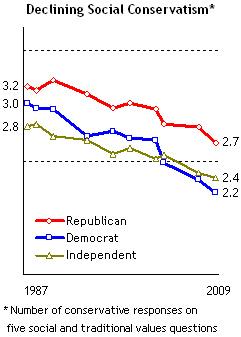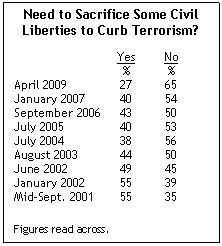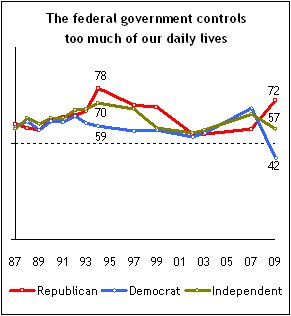New boss, same as the old boss, chapter 26
President Barack Obama is actively considering issuing an executive order authorizing the continued, indefinite detention of terrorism suspects, without trial, according to the Washington Post and Pro Publica. The news is widely being treated as a shocking about-face for a president who has criticized his predecessor's harsh tactics in dealing with alleged terrorists. But for anybody paying attention, this is just one more step along a path the president has has already traveled, with indefinite detention hinted at in a May speech and even championed by the Obama administration in legal papers filed in March.
According to the Washington Post report:
Obama administration officials, fearing a battle with Congress that could stall plans to close the U.S. prison at Guantanamo Bay, are crafting language for an executive order that would reassert presidential authority to incarcerate terrorism suspects indefinitely, according to three senior government officials with knowledge of White House deliberations.
Such an order would embrace claims by former president George W. Bush that certain people can be detained without trial for long periods under the laws of war. Obama advisers are concerned that an order, which would bypass Congress, could place the president on weaker footing before the courts and anger key supporters, the officials said.
Indefinite detention, which flies in the face of Obama's campaign-trail civil libertarian attacks on the Bush administration, could apply to as many as half of the 229 detainees currently held at Guantanamo Bay. And, while it's a sharp departure from the position he took while courting voters, it's very clearly a logical outcome of the direction in which he's been moving since taking office.
On May 21, President Obama gave a speech on national security in which he addressed the issue of detention. He took care to criticize Bush-era detention policies, but then allowed that he might do the same thing -- though only with congressional approval.
[T]here remains the question of detainees at Guantanamo who cannot be prosecuted yet who pose a clear danger to the American people. And I have to be honest here -- this is the toughest single issue that we will face. We're going to exhaust every avenue that we have to prosecute those at Guantanamo who pose a danger to our country. But even when this process is complete, there may be a number of people who cannot be prosecuted for past crimes, in some cases because evidence may be tainted, but who nonetheless pose a threat to the security of the United States. Examples of that threat include people who've received extensive explosives training at al Qaeda training camps, or commanded Taliban troops in battle, or expressed their allegiance to Osama bin Laden, or otherwise made it clear that they want to kill Americans. These are people who, in effect, remain at war with the United States.
Let me repeat: I am not going to release individuals who endanger the American people. Al Qaeda terrorists and their affiliates are at war with the United States, and those that we capture -- like other prisoners of war -- must be prevented from attacking us again. Having said that, we must recognize that these detention policies cannot be unbounded. They can't be based simply on what I or the executive branch decide alone. That's why my administration has begun to reshape the standards that apply to ensure that they are in line with the rule of law. We must have clear, defensible, and lawful standards for those who fall into this category. We must have fair procedures so that we don't make mistakes. We must have a thorough process of periodic review, so that any prolonged detention is carefully evaluated and justified.
I know that creating such a system poses unique challenges. And other countries have grappled with this question; now, so must we. But I want to be very clear that our goal is to construct a legitimate legal framework for the remaining Guantanamo detainees that cannot be transferred. Our goal is not to avoid a legitimate legal framework. In our constitutional system, prolonged detention should not be the decision of any one man. If and when we determine that the United States must hold individuals to keep them from carrying out an act of war, we will do so within a system that involves judicial and congressional oversight. And so, going forward, my administration will work with Congress to develop an appropriate legal regime so that our efforts are consistent with our values and our Constitution.
Implementing indefinite detention via executive order would abandon this earlier commitment to work with Congress and bring the new president's position even closer to that of former President George W. Bush.
But even the May speech can be seen as a follow-up to a March 13 filing with the federal district court for the District of Columbia. In that document, the administration reasserted the Bush-era argument for holding detainees.
The President has the authority to detain persons that the President determines planned, authorized, committed, or aided the terrorist attacks that occurred on September 11, 2001, and persons who harbored those responsible for those attacks. The President also has the authority to detain persons who were part of, or substantially supported, Taliban or al-Qaida forces or associated forces that are engaged in hostilities against the United States or its coalition partners, including any person who has committed a belligerent act, or has directly supported hostilities, in aid of such enemy armed forces.
An accompanying statement explained that the Obama administration had tweaked the legal rationale for indefinite detention -- but still planned to maintain that policy.
[T]he Department of Justice submitted a new standard for the government’s authority to hold detainees at the Guantanamo Bay Detention Facility. The definition does not rely on the President’s authority as Commander-in-Chief independent of Congress’s specific authorization. It draws on the international laws of war to inform the statutory authority conferred by Congress. It provides that individuals who supported al Qaeda or the Taliban are detainable only if the support was substantial. And it does not employ the phrase "enemy combatant."
Taken all together, it's clear that the Obama administration has been moving toward a policy of indefinite detention of detainees under the unilateral authority of the president -- a position much like that taken by the Bush administration -- since before the moving boxes were unpacked in the White House.
Labels: civil liberties






